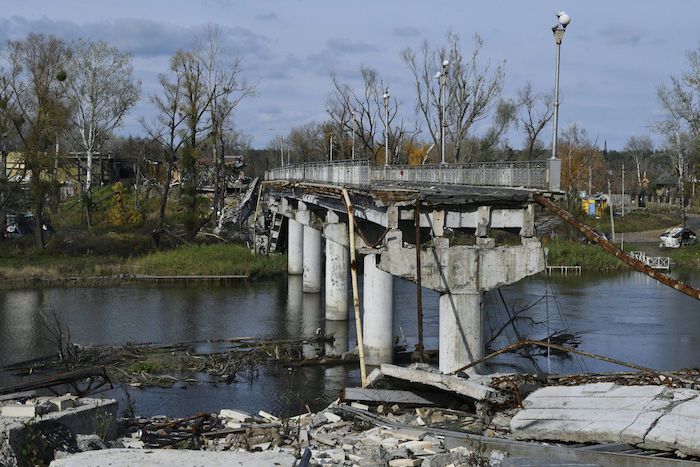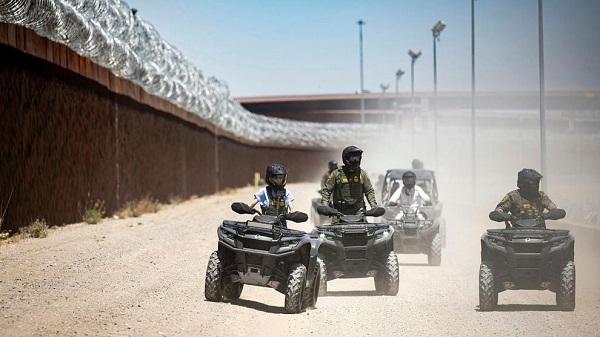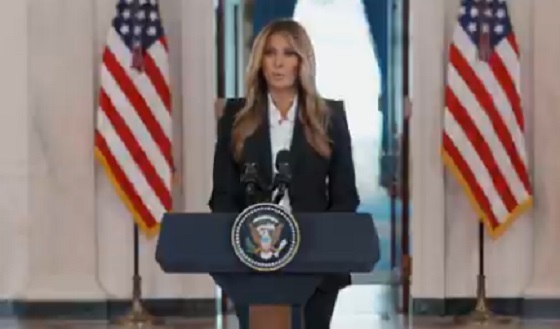International
Russia says it will suspend UN-brokered Ukraine export deal

By Andrew Meldrum in Kyiv
KYIV, Ukraine (AP) — Russia announced Saturday that it will move to suspend its implementation of a U.N.-brokered grain deal that has seen more than 9 million tons of grain exported from Ukraine during the war and has brought down soaring global food prices.
The Russian Defense Ministry cited an alleged Ukrainian drone attack against Russia’s Black Sea Fleet ships moored off the coast of occupied Crimea, which Russia says took place early Saturday, as the reason for the move. Ukraine has denied the attack, saying that the Russians mishandled their own weapons.
The Russian declaration came one day after U.N. chief Antonio Guterres urged Russia and Ukraine to renew the grain export deal. Guterres also urged other countries, mainly in the West, to expedite the removal of obstacles blocking Russian grain and fertilizer exports.
The U.N. chief said the grain deal — brokered by the United Nations and Turkey in July and which expires on Nov. 19 — helps “to cushion the suffering that this global cost-of-living crisis is inflicting on billions of people,” his spokesman said.
A Guterres spokesman said U.N. officials were in touch with Russian authorities over the announced suspension.
“It is vital that all parties refrain from any action that would imperil the Black Sea Grain Initiative, which is a critical humanitarian effort that is clearly having a positive impact on access to food for millions of people,” said the spokesman, Stephane Dujarric.
Russia’s Foreign Ministry on Saturday accused British specialists of being involved in the alleged attack by drones on Russian ships in Crimea.
“In connection with the actions of Ukrainian armed forces, led by British specialists, directed, among other things, against Russian ships that ensure the functioning of the humanitarian corridor in question (which cannot be qualified otherwise than as a terrorist attack), the Russian side cannot guarantee the safety of civilian dry cargo ships participating in the Black Sea initiative, and suspends its implementation from today for an indefinite period,” the Russian statement said.
Britain’s Defense Ministry had no immediate comment.
Ukraine’s Foreign Minister, Dmytro Kuleba, accused Russia of playing “hunger games” by imperiling global food shipments.
“We warned about Russia’s plans to destroy the (grain agreement). Now, under false pretenses, Moscow is blocking the grain corridor that ensures food security for millions of people,” he tweeted Saturday.
The head of the Ukrainian presidential office, Andriy Yermak, denounced the suspension as “primitive blackmail.”
Turkish officials said they haven’t received any official notice of the deal’s suspension.
Russia’s agriculture minister said Moscow stands ready to “fully replace Ukrainian grain and deliver supplies at affordable prices to all interested countries.” In remarks carried by the state Rossiya 24 TV channel, Dmitry Patrushev said Moscow was prepared to “supply up to 500,000 tons of grain to the poorest countries free of charge in the next four months,” with the help of Turkey.
Patrushev also reiterated the Kremlin’s earlier allegations that a disproportionate volume of grain exported from Ukraine’s Black Sea ports was bound for European destinations.
Earlier Saturday, Ukraine and Russia offered differing versions on the Crimea drone attack in which at least one Russian ship suffered damage in the port on the Ukrainian peninsula annexed by Moscow in 2014.
The Russian Defense Ministry said a minesweeper had “minor damage” during an alleged pre-dawn Ukrainian attack on navy and civilian vessels docked in Sevastopol, which hosts the headquarters of Russia’s Black Sea Fleet. The ministry claimed Russian forces had “repelled” 16 attacking drones.
The governor of the Sevastopol region, Mikhail Razvozhaev, said the port saw “probably the most massive attack” by air and sea drones. He provided no evidence, saying all video from the area would be held back for security reasons.
But an adviser to Ukraine’s Interior Ministry claimed that “careless handling of explosives” had caused blasts on four warships in Russia’s Black Sea Fleet. Anton Gerashchenko wrote on Telegram that the vessels included a frigate, a landing ship and a ship that carried cruise missiles used in a deadly July attack on a western Ukrainian city.
In other developments on Saturday, Russian troops moved large numbers of sick and wounded comrades from hospitals in Ukraine’s southern Kherson region and stripped the facilities of medical equipment, Ukrainian officials said as their forces fought to retake the province.
Kremlin-installed authorities in the mostly Russian-occupied region had previously urged civilians to leave the city of Kherson, the region’s capital — and reportedly joined the tens of thousands who fled to other Russia-held areas.
“The so-called evacuation of invaders from the temporarily occupied territory of the Kherson region, including from medical institutions, continues,” the General Staff of the Armed Forces of Ukraine said.
Ukrainian President Volodymyr Zelenskyy said the Russians were “dismantling the entire health care system” in Kherson and other occupied areas.
“The occupiers have decided to close medical institutions in the cities, take away equipment, ambulances. just everything,” Zelenskyy said.
Kherson is one of four regions in Ukraine that Russian President Vladimir Putin illegally annexed last month and where he subsequently declared martial law. The others are Donetsk, Luhansk and Zaporizhzhia.
As Kyiv’s forces sought gains in the south, Russia kept up its shelling and missile attacks in the country’s east, Ukrainian authorities said Saturday. Three more civilians died and eight more were wounded in the Donetsk region, which has again become a front-line hotspot as Russian soldiers try to capture the city of Bakhmut, an important target in Russia’s stalled eastern offensive.
Russian shelling also an industrial building in Ukraine’s southern Zaporizhzhia region. Around a quarter of the region — including its capital, also called Zaporizhzhia — remains under Ukrainian military control.
In the latest prisoner exchange, 52 Ukrainians, including two former defenders of the Azovstal steel plant in Mariupol, were released Saturday as part of a swap with Russia, according to Yermak. The steelworks in that bombed-out port city now symbolize Ukrainian resistance.
Also released, he said, was a sailor who defended Ukraine’s Snake Island, a strategic Black Sea outpost seized by Russia in the opening hours of the war. Others coming home were Ukrainian soldiers captured by Moscow near the Chernobyl nuclear power plant — the site of the world’s worst nuclear disaster in 1986 — which Russian forces briefly occupied from February to March.
___
This version has been corrected to show the Russian Defense Ministry said one ship, not two, was slightly damaged in Crimea port.
___
Follow AP’s coverage of the war in Ukraine: https://apnews.com/hub/russia-ukraine
illegal immigration
$4.5B awarded in new contracts to build Smart Wall along southwest border

Homeland Security Secretary Kristi Noem rides an ATV along the U.S.-Mexico border wall in El Paso, Texas, on April 28, 2025. Photo: Tia Dufour / U.S. Department of Homeland Security
From The Center Square
By
New contracts to add 230 miles of barriers, nearly 400 miles of technology
Roughly $4.5 billion in contracts have been awarded to expand border wall construction, including adding advanced technological surveillance along the southwest border.
Ten new construction contracts have been awarded through the U.S. Department of Homeland Security and U.S. Customs and Border Protection to add hundreds of miles of Smart Wall in California, Arizona, New Mexico and Texas.
“For years, Washington talked about border security but failed to deliver. This President changed that,” CBP Commissioner Rodney Scott said. “The Smart Wall means more miles of barriers, more technology, and more capability for our agents on the ground. This is how you take control of the border.”

Scott has championed advancing a Smart Wall border security system for years. A border security system is far more than a wall, he has told The Center Square, it’s an ecosystem.
The system encompasses steel and waterborne barriers, patrol roads, lights, cameras, advanced detection technology, including towers and aerostats, to provide Border Patrol agents with a range of tools to detect and interdict illegal activity.
CBP has published an interactive map to educate the public about the Smart Wall system. The map highlights areas of the 1,954-mile U.S.-Mexico border where wall construction has been completed, where border wall panels or waterborne barriers are under construction, where contracts have been awarded for proposed projects in the design phase or early construction, and planned construction areas that haven’t yet been awarded contracts.
Prior to Jan. 20, 2025, 702 miles of existing barriers had been constructed of primary wall and 76 miles of secondary wall, according to CBP data.
The new plan includes implementing barrier technology along 532 miles of the border where no barrier exists because of unfavorable terrain or remote location. It also includes deploying 550 miles of technology throughout previously constructed barriers, CBP says. Specific areas are also being built out in regions where contracts were previously canceled by the Biden administration.
In California, $483.5 million in taxpayer funding was awarded to BCCG Joint Venture for the Diego 1 Project to construct nine miles of new Smart Wall and 52 miles of system attributes in the San Diego Sector.
An additional $574 million was awarded to Fisher Sand & Gravel Co. for the El Centro 1 Project to construct eight miles of Smart Wall and install 63 miles of system attributes in the San Diego and El Centro sectors.
In California and Arizona, $199.5 million was awarded to Barnard Spencer Joint Venture for the Yuma 1 Project to construct 60 miles of system attributes in the Yuma Sector.
In Arizona, nearly $607 million was awarded to BCCG for the Tucson 1 Project to construct 23 miles of new secondary border wall and 66 miles of system attributes in the Tucson and Yuma sectors.
In New Mexico, $155.1 million was awarded to BCCG for the El Paso 1 Project to replace seven miles of old dilapidated barrier fencing in the Santa Teresa Area of Responsibility with a new Smart Wall. BCCG will also complete 22 miles of system attributes in the El Paso Sector in New Mexico.
Also in the El Paso Sector in New Mexico, Barnard Spencer Joint Venture was awarded nearly $579 million for the El Paso 2 Project to construct 23 miles of new Smart Wall and 81 miles of system attributes.
In the El Paso Sector in far west Texas, BCCG Joint Venture was awarded $850.4 million for the El Paso 3 Project to construct 42 miles of new primary Smart Wall, six miles of new secondary border wall and 46 miles of system attributes.
In Texas, BCCG Joint Venture was awarded $565 million for the Del Rio 1 Project to construct 22 miles of new primary Smart Wall, replace two miles of old barrier wall, and deploy 40 miles of waterborne barrier system in the Eagle Pass Area of Responsibility in the Del Rio Sector.
BCCG was also awarded $364.3 million for the Del Rio 2 Project to construct 10 miles of new primary Smart Wall, 23 miles of waterborne barrier system, and install 10 miles of system attributes in Eagle Pass.
BCCG was also awarded $96.1 million for the Rio Grande Valley Waterborne Barrier Project to deploy 17 miles of waterborne barrier in the Rio Grande River, south of Brownsville in Cameron County in the Rio Grande Valley Sector.
Another $550 million worth of contracts was also awarded to support Smart Wall construction. Additional construction and contracts are expected.
Funding for the projects comes from the “One Big Beautiful Bill,” which President Donald Trump signed into law. It also includes some fiscal year 2021 border wall appropriations that were frozen during the Biden administration.
Waivers were also issued by DHS Secretary Kristi Noem to expedite construction of nine miles in the San Diego Sector and 30 miles in the El Paso Sector in New Mexico. Both sectors were inundated with record high illegal traffic during the Biden administration.
International
Melania Trump quietly reunites children divided by Ukraine war

Quick Hit:
Melania Trump announced Friday that she’s maintained an “open channel” with Russian President Vladimir Putin, leading to the reunification of eight Ukrainian children with their families. The effort began with a personal letter she sent to Putin in August and has since expanded into coordinated talks between her representatives and Russian officials.
Key Details:
- During remarks in the White House grand foyer Friday, Melania Trump said, “A child’s soul knows no borders,” as she announced the reunification of eight Ukrainian children separated by the ongoing war.
- The first lady said she first reached out to Putin in a letter delivered during President Trump’s August 15 summit in Alaska, adding that “much has unfolded since President Putin received my letter.”
- Trump confirmed that “several backchannel meetings and calls” have since taken place, and that her representative has been working directly with Putin’s team to help connect displaced children with their families.
Announcement from First Lady Melania Trump @FLOTUS @WhiteHouse pic.twitter.com/zaOIhK8uAe
— Office of the First Lady (@FirstLadyOffice) October 10, 2025
Diving Deeper:
In an unexpected and emotional statement from the White House grand foyer Friday, Melania Trump revealed that her private outreach to Russian President Vladimir Putin resulted in the reunification of eight Ukrainian children with their families.
Trump said her involvement began with a letter to Putin, hand-delivered during President Trump’s August 15 summit in Alaska. “Much has unfolded since President Putin received my letter,” she said, describing how the correspondence evolved into a continuing dialogue between her office and Russian officials. “Since then, President Putin and I have had an open channel of communication,” she explained, adding that “several backchannel meetings and calls” have taken place to facilitate humanitarian coordination.
According to Trump, eight children have already been returned to their families within the past 24 hours — including one girl reunited with relatives across the Russia-Ukraine border — and “plans are already underway” for additional reunifications.
Trump framed the effort as part of her broader humanitarian mission to protect children affected by conflict. “A child’s soul knows no borders,” she said, emphasizing that political boundaries should never prevent the return of children to their loved ones.
She added that her representatives have been working directly with Putin’s team to locate and repatriate displaced minors. Several of the children involved in the latest effort were taken across borders during heavy fighting in eastern Ukraine, while others had been separated from relatives due to the chaos of war.
While details of the behind-the-scenes coordination remain limited, Trump’s announcement highlights the humanitarian possibilities that still exist even amid strained relations between the two nations.
-

 National2 days ago
National2 days agoCanada’s birth rate plummets to an all-time low
-

 Crime2 days ago
Crime2 days agoPierre Poilievre says Christians may be ‘number one’ target of hate violence in Canada
-

 Opinion21 hours ago
Opinion21 hours agoJordan Peterson needs prayers as he battles serious health issues, daughter Mikhaila says
-

 COVID-1917 hours ago
COVID-1917 hours agoDevastating COVID-19 Vaccine Side Effect Confirmed by New Data: Study
-

 Alberta2 days ago
Alberta2 days agoJason Kenney’s Separatist Panic Misses the Point
-

 Censorship Industrial Complex22 hours ago
Censorship Industrial Complex22 hours agoWinnipeg Universities Flunk The Free Speech Test
-

 Red Deer11 hours ago
Red Deer11 hours agoThe City of Red Deer’s Financial Troubles: Here Are The Candidates I Am Voting For And Why.
-

 Automotive2 days ago
Automotive2 days agoBig Auto Wants Your Data. Trump and Congress Aren’t Having It.

